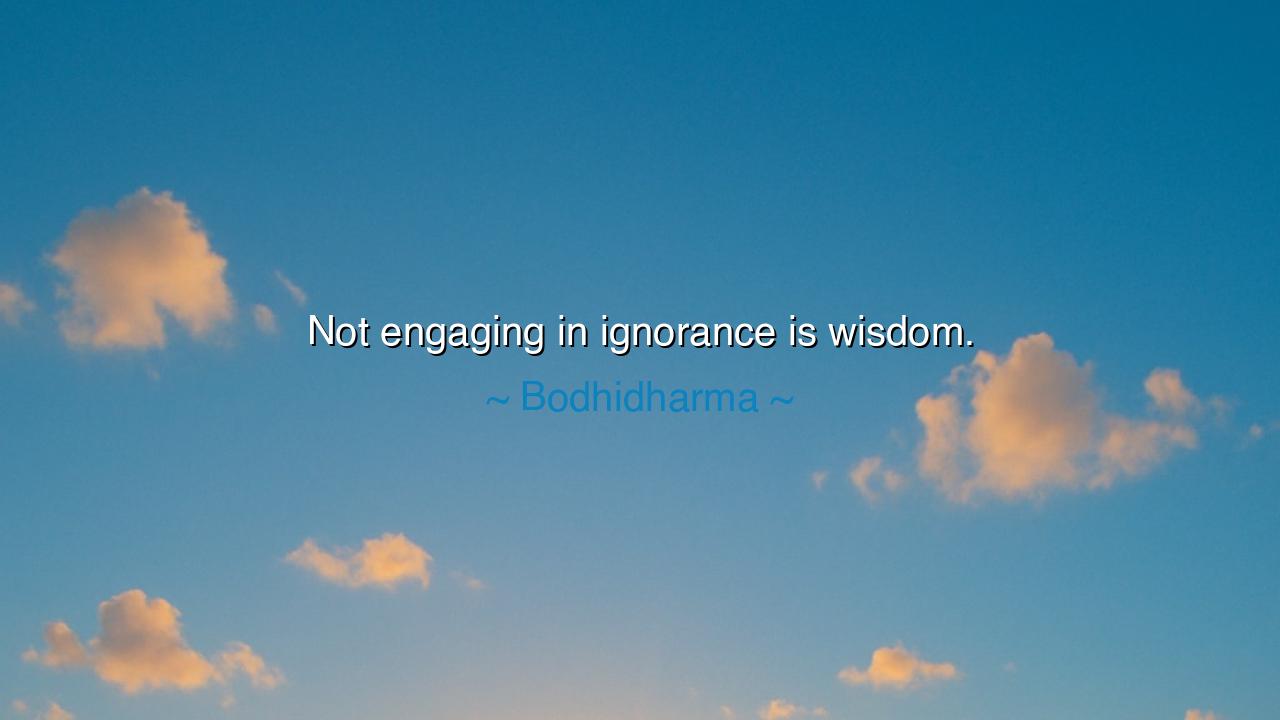
Not engaging in ignorance is wisdom.






Bodhidharma, the wandering sage who carried the flame of Zen from India to China, speaks with clarity sharper than a sword: “Not engaging in ignorance is wisdom.” In this utterance lies a teaching as simple as it is profound. True wisdom is not in endless accumulation of knowledge, nor in clever arguments, but in refusing to be ensnared by ignorance—the blindness of ego, desire, and delusion. To turn from folly, to step aside from error, is itself enlightenment.
The ancients of every land knew this path. Socrates, when he confessed, “I know that I know nothing,” was practicing the same teaching. He would not clothe himself in false certainty, nor engage the vanity of ignorance. His humility became his greatness, for by rejecting illusion he walked toward truth. So too does Bodhidharma teach that wisdom is not gained by contending with ignorance, but by letting it fall away like dust from the robe of the traveler.
History bears witness in the life of Buddha himself. Before his enlightenment, he sought wisdom in extreme asceticism, torturing the body in ignorance of the middle way. Only when he refused to engage in such error, when he sat beneath the Bodhi tree and turned away from delusion, did he awaken to truth. By refusing ignorance, he embodied wisdom, and his silence before Mara’s temptations was louder than a thousand arguments.
Even in more recent times, the same lesson shines. Mahatma Gandhi, confronted by the violence and hatred of empire, did not engage in the ignorance of rage. Instead, he chose nonviolence, truth, and self-restraint. His refusal to meet ignorance on its own terms was his greatest wisdom, and by it he moved the conscience of the world. Thus, Bodhidharma’s teaching resounds across ages: to rise above ignorance is greater than to conquer it in battle.
Let the generations remember: wisdom is not endless striving, nor pride in one’s cleverness, but the simple, heroic act of turning away from ignorance. To feed ignorance with words is to give it life; to refuse it is to let it perish. The wise man does not argue with the fool, nor dance with the shadows, but stands still in the light. And in that stillness is freedom, clarity, and the strength of truth eternal.






NHNguyen Hai
This statement makes me consider the emotional dimension of wisdom. Sometimes engaging with ignorance feels necessary—especially when it’s harmful or oppressive. So does Bodhidharma mean to avoid confrontation entirely, or to engage without being consumed by ignorance ourselves? The quote seems to suggest that wisdom isn’t about winning arguments, but about maintaining inner clarity even in the presence of misunderstanding or falsehood.
DTTran Da Thao
I’m intrigued by the spiritual undertone here. If ignorance is a fundamental human condition, then wisdom might be the practice of awareness—of seeing without reacting, of understanding without judgment. But is it truly possible to avoid ignorance completely, or is the process of resisting it what makes one wise? It seems like a lifelong discipline, requiring mindfulness and humility rather than intellectual superiority.
DMNguyen Dinh Duc Manh
This quote prompts me to think about the discipline required to remain clear-minded. Ignorance isn’t just a lack of knowledge; it can be arrogance, denial, or self-deception. Does wisdom then mean recognizing these tendencies in ourselves and refusing to indulge them? I also wonder how this idea applies to social media culture, where engaging with ignorance often amplifies it. Perhaps true wisdom is choosing when not to respond.
THHuynh Le Thanh Hang
I find this statement both calming and challenging. It seems to suggest that wisdom is less about accumulating insight and more about discernment—choosing not to waste energy on foolishness. But does that mean true wisdom is passive, or can it involve gently correcting ignorance when encountered? I wonder how Bodhidharma would view activism or education—are they acts of engagement or means of transcending ignorance altogether?
GBNguyen Ngo Gia Bao
Reading this, I’m struck by how simple yet difficult the idea is. If wisdom lies in not participating in ignorance, then silence or nonreaction can be the most intelligent response. But how does one distinguish between healthy detachment and apathy? I also question whether avoiding ignorance means disengagement from conflict or the active choice to respond with clarity and compassion instead of anger or pride.